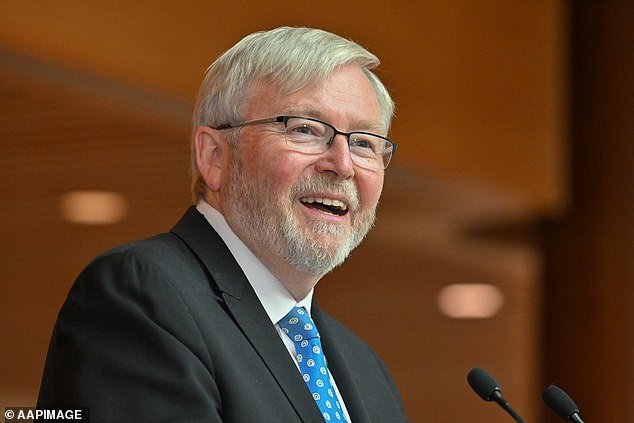New details have surfaced about a meeting between US President Donald Trump and Australia’s ambassador to the US Kevin Rudd.
The pair had a private meeting at the start of the year, and little is known about what was discussed. However, answers to questions by opposition finance spokesman James Paterson during Senate estimates provided some details.
‘Ambassador Rudd met President Trump in the dining room of the Trump International Golf Club in West Palm Beach, Florida, on January 11, 2025,’ the Department of Foreign Affairs and Trade said in response to a query about the pair’s meeting.
It also revealed that a diplomatic cable, a confidential exchange, said: ‘Ambassador Rudd has professional relationships with and has met with a range of senior administration officials.’
Other than that, nothing official about the meeting had been released.
The news comes as the Albanese government faces criticism over its relationship with President Trump, who announced a delay to the implementation of damaging levies on US imports, while targeting copper and pharmaceuticals with new tariffs.
Concerns have been raised about whether Mr Rudd is the right person to engage with Trump, given his past remarks about the president.
In 2021, Mr Rudd referred to Trump as a ‘village idiot,’ a ‘traitor to the West,’ and ‘the most destructive president in history.’

Kevin Rudd was critisied by opposition trade spokesman Kevin Hogan

Rudd met with Trump at his gold club in January, it’s been revealed
But Prime Minister Anthony Albanese said his government has been ‘constructively’ engaging with the Trump administration and any arrangements would be in Australia’s national interest.
‘I’ve made it very clear that the issues such as the Pharmaceutical Benefits Scheme, the Media Bargaining Code and our bio laws to protect our agricultural interest are not on the table for negotiations,’ Albanese said.
‘They’re a part of who Australia is.’
Kevin Hogan, the Coalition’s shadow trade minister, was critical of Prime Minister Anthony Albanese for failing to secure an in-person meeting with Trump – like his UK Labour counterpart Keir Starmer – to secure less punitive tariffs.
‘Obviously, at the moment, it doesn’t appear to be a personal relationship at all which is disappointing,’ he said.
‘We don’t agree with Trump on a number of issues and that’s okay to disagree with friends and allies.
‘There’s a real question mark that has to be asked over the Prime Minister and his unwillingness or inability to get a one-on-one meeting with the US President.’
Starmer did a deal to get steel and aluminium tariffs reduced from 50 per cent to 25 per cent but is hoping for zero.

Kevin Hogan, the Coalition’s shadow trade minister, was critical of Prime Minister Anthony Albanese for failing to secure an in-person meeting with Trump

Prime Minister Anthony Albanese said his government has been ‘constructively’ engaging with the Trump administration and any arrangements would be in Australia’s national interest
August 1 is the deadline for the imposition of ‘reciprocal tariffs,’ and dozens of US trading partners are under pressure to finalise new trade deals.
The US president has laid out plans to impose 200 per cent tariffs on drug imports in a year’s time, threatening Australia’s third-most significant export to America as he expands his trade war.
Trump’s proposal comes after lobbying by the powerful US pharmaceutical sector, which has long taken issue with Australia’s drug subsidy scheme and wants the president to act.
His announcement could be seen as a way for the US to chip away at the Pharmaceutical Benefits Scheme in exchange for a trade deal.
Trump also revealed a 50 per cent tariff on copper imported to the US, but that poses little problem for Australia because the US accounts for less than one per cent of the nation’s exports of the metal.
By comparison, Australia sent $2.1 billion worth of medicinal and pharmaceuticals to the US in 2024, Australia Bureau of Statistics figures show.
Trump assured that drug manufacturers will be given ‘about a year, year and a half’ to relocate to the US in a bid to escape the tariff.
‘They’re going to be tariffs at a very high rate,’ he told reporters.
‘We’ll give them a certain period of time to get their act together.’
Trump is confident further agreements will be finalised in the coming days.
The president’s remarks are the latest in a series of new trade measures, after he unveiled an increased 25 per cent tariff on items from Japan and Korea, which are Australia’s second- and third-biggest export markets.
A number of countries have tried to strike trade deals with the US and Albanese has faced increasing pressure to schedule a face-to-face meeting with Trump.
But it was unclear if that would work, University of Sydney associate professor David Smith said.
‘Now we’re in a situation where the US is trying to negotiate 100 trade deals at once – it’s clearly beyond the capacity of American negotiators,’ he said.


























